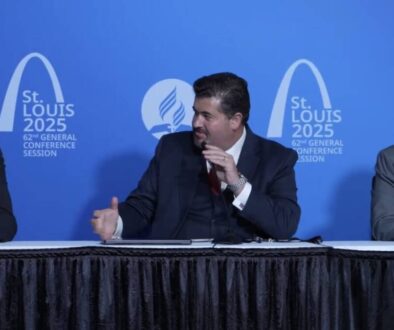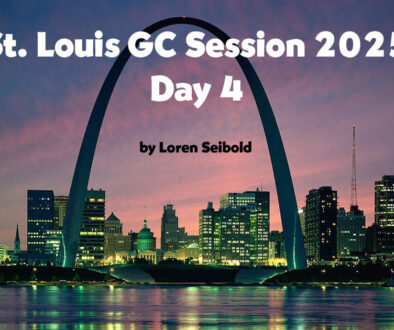Glendale Congregation Becomes First Adventist Peace Church
By AT News Team, Jan. 30, 2015: The Glendale City Seventh-day Adventist Church in Glendale, CA, is the first congregation to be certified as a “peace church” by the Adventist Peace Fellowship (APF). In order to join “the Adventist Peace Church network, churches must demonstrate a serious long-term commitment to certain core values and ongoing practical actions in their local communities,” states the APF website.
Todd Leonard, the congregation’s senior pastor, explained to Adventist Today why he values service and social values in ministry: “I really feel that bringing peace into communities…seems to be at the heart of the gospel. From what I read in the prophets, from looking at what Jesus did during his ministry and then carried on in the early church, there appears to be this work to include more people…in the blessings of God.”
In the past year, Glendale City Church has co-founded two nonprofit community service agencies—Caesura Youth Orchestra and Glendale Communitas Initiative. The music program provides instruments and instruction for elementary students who would otherwise have little access to musical training.
Communitas, which is a network of congregations from twelve different denominations, aims to reduce poverty in Glendale by 10 percent over the next five years. To accomplish this, Communitas is bringing together organizations in the religious, government, business and nonprofit sectors to coordinate service delivery for families at risk of becoming homeless. In addition to referrals for currently available services, Communitas will provide mentors “from other civic groups like Rotary or Glendale Young Professionals,” explains Leonard. “Each mentor,” he continues, “would meet with a family member an hour per week for an entire year.”
The Glendale congregation could continue to pursue these efforts locally without joining the APF peace church network; however, Leonard sees two reasons for connecting with APF. “One, we would love to have the collaboration and collegiality of networking with other churches who have the same mission and vision for their congregation. We can share ideas, share what’s working in our local context, find resources that would be beneficial for one another,” shared Leonard.
Secondly, Leonard hopes the network will “be something that more and more Adventist churches would want to be a part of, that they would reconnect with some of our heritage of not only preaching about the kingdom to come but actively working in society to make life better for the world we’re in and to work towards God’s purposes without violence.”
In order to support congregations in the network, APF director Ron Osborn told Adventist Today that the APF is prepared to “provide grants, as funding allows, to Adventist peace churches for projects they might be pursuing in their local communities. We are also committed to helping call attention to their activities through our blog and social media. The APF is really a platform and ‘network of networks’ that we hope can serve as a ‘force multiplier’ for congregations that might otherwise feel isolated and disconnected from Adventist community in their too-often unsupported work for peace and social justice.”
Four other congregations are currently in the peace church certification process—Advent Hope Church (NY), Anaheim Seventh-day Adventist Church (CA), Hollywood Adventist Church (CA), and The Well (TN). The APF website outlines nine steps toward certification, with the major actions including: (a) contacting APF to initiate the process, (b) passing a church board resolution expressing intent to join the network, (c) identifying a key area of action, (d) demonstrating commitment to the values of peace and justice over a one-year period, and (e) reporting the congregation’s sustained efforts to APF for evaluation.
On its website the Adventist Peace Fellowship describes itself as a non-profit lay organization that seeks to raise consciousness about the centrality of peacemaking to the beliefs and heritage of Seventh-day Adventists. The APF is not officially affiliated, funded, or controlled by the Seventh-day Adventist Church and does not speak on the Church’s behalf.
In 2003 Washington Adventist University history professor Douglas Morgan founded the APF with leadership support from Ron Osborn and approximately 20 Adventist scholars, administrators, pastors, and graduate students throughout the United States. In a 2011 interview with Adventist Today, Morgan shared about the early developments that led to the formation of the fellowship during the build up to the war in Iraq after the 9/11 terrorist attacks: “It started off as a discussion group there at CUC [now Washington Adventist University] and the surrounding community. We read John Howard Yoder’s The Politics of Jesus. I think in 2002 we decided to reach out to people who were on other campuses, the circles we were already familiar with.”[1] Morgan became the first director, and Osborn took over the role in 2011.
Originally, the organization’s focus was on peacemaking in the context of war and violence. Over time APF expanded its scope, and “efforts today include…care for creation, economic justice, freedom of conscience for persons both inside and outside of the Adventist community, racial and gender equality, and the nexus of health and human rights,” says the APF website.
In addition to online resources available via the APF website, the fellowship has produced two resources for distribution. “In 2005, the APF published its first book, The Peacemaking Remnant: Essays and Historical Documents, edited by Morgan, which has been used in college level courses as an introduction to the social ethics of Adventism with a particular focus on questions of violence and war,” states the APF website. In 2015 APF published its first calendar, which includes major figures in Adventist peace history along with quotes and notable dates.
Congregations interested in learning more about the peace church network can visit the APF website (link) or contact APF leadership (link). Readers can also learn more about the Glendale City Adventist Church in Adventist Today’s recent interview with Leonard (link).
– – –



